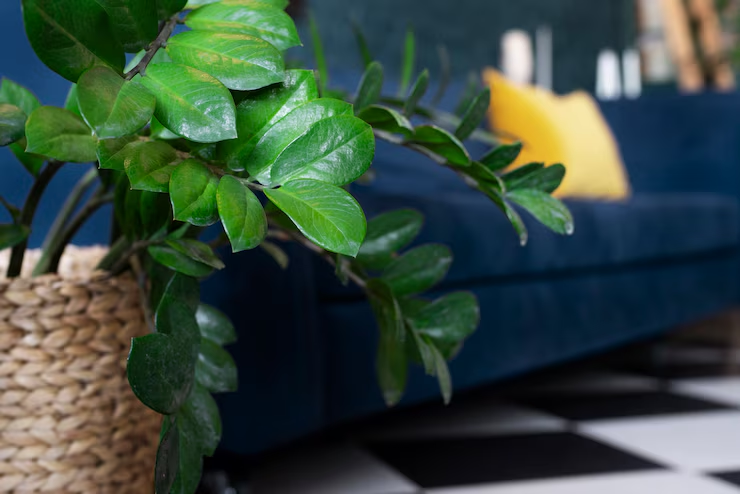You water, you prune, you place your plants in the perfect light — but when was the last time you cleaned their leaves? Just like furniture or countertops, plant leaves collect dust over time. But unlike those objects, dust on plant leaves can actually affect their health.
In this article, we’ll show you why cleaning your plant’s leaves is essential, how often to do it, and the best (and easiest) methods to keep them looking glossy, vibrant, and thriving.
Why Clean Indoor Plant Leaves?
Dust might seem harmless, but for plants, it’s more than a cosmetic issue.
🌿 Here’s what happens when leaves get dirty:
- Blocked sunlight: Dust interferes with photosynthesis, reducing the plant’s energy production.
- Attracts pests: Dirty, neglected plants are more appealing to bugs like spider mites and scale.
- Traps moisture: Debris and grime can lead to mold or mildew on the leaves.
- Stunts growth: Less light = less food = slower or weaker growth.
- Looks dull and unhealthy: Shiny, clean leaves make your plant (and space) look fresh and polished.
How Often Should You Clean Plant Leaves?
It depends on your home’s environment. Generally:
- Once a month for most homes
- Every 2–3 weeks if you live in a city, dusty climate, or near open windows
- Every few days for large, broad-leaf plants that show dust easily (like fiddle leaf figs or rubber plants)
A quick dust-check during your watering routine is an easy habit to build.
Best Methods for Cleaning Plant Leaves
There’s no one-size-fits-all method. The best technique depends on the size and type of plant, as well as how dirty it is.
🧼 1. Wipe with a Damp Cloth
Perfect for broad, sturdy leaves (like rubber plants, monstera, or philodendron).
How to do it:
- Use a soft microfiber cloth or old t-shirt
- Dampen with lukewarm water (no soap needed)
- Gently support the leaf with one hand and wipe with the other
Avoid using paper towels — they can leave lint and scratch the surface.
🚿 2. Give Your Plant a Shower
Great for many small- to medium-sized houseplants (especially ferns, palms, or ivy).
How to do it:
- Place your plant in the sink, bathtub, or shower
- Use lukewarm water with gentle pressure
- Let it drain fully after to avoid root rot
Tip: Cover the soil with plastic or foil to avoid washing away nutrients.
💨 3. Use a Soft Brush or Paintbrush
Ideal for delicate or fuzzy-leafed plants like African violets or succulents.
How to do it:
- Use a small paintbrush or makeup brush
- Gently sweep away dust in the direction the leaves grow
- Do this regularly to avoid buildup
Avoid getting fuzzy leaves wet — they can rot easily.
🌱 4. Spray and Wipe
For plants that need a deeper clean (especially if you see residue or buildup).
How to do it:
- Mix a spray bottle with lukewarm water
- Optional: Add a drop of mild dish soap (no detergent or chemicals)
- Spray, wait a few seconds, and wipe with a cloth
Alternative mix: Water + 1 tsp neem oil = clean and pest prevention in one step.
What About Leaf Shine Products?
It’s tempting to use commercial “leaf shine” sprays for that glossy finish — but they’re not recommended for regular use.
Why to avoid them:
- They can clog leaf pores (called stomata)
- They may attract dust faster
- Some include chemicals that harm sensitive plants
Better option: Clean naturally with water or a neem oil solution for safe, subtle shine.
Extra Tips for Leaf Care
✅ Rotate your plants regularly for even growth and light exposure
✅ Trim yellow or damaged leaves as needed
✅ Inspect for pests while cleaning — this is your chance to catch issues early
✅ Check underneath the leaves, too — pests and dust like to hide there
✅ Clean your tools and cloths after each use to prevent spreading pests or fungus
Special Considerations by Plant Type
| Plant Type | Cleaning Method |
| Fiddle Leaf Fig | Damp cloth wipe |
| Rubber Plant | Damp cloth or spray & wipe |
| Pothos | Shower or wipe |
| Peace Lily | Wipe or shower |
| Spider Plant | Shower or brush |
| Succulents | Soft brush only |
| Ferns | Light rinse or shower |
| African Violet | Brush only – avoid water on leaves |
Clean Leaves = Happy Plants
Keeping your plant’s leaves clean doesn’t just improve their looks — it helps them breathe, grow, and thrive. It’s one of the simplest plant care habits you can build, and it makes a big difference over time.
So next time you’re watering, give those leaves a little love too. Your plants will thank you with lush growth and a fresh, healthy glow.

